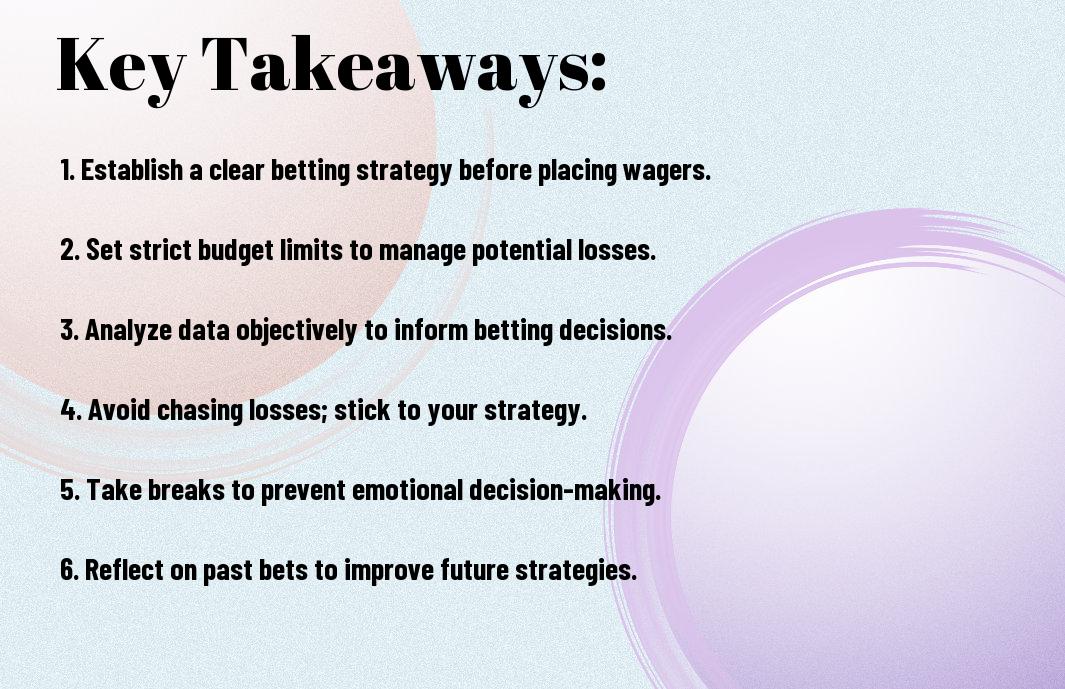As you engage in betting, your emotions can significantly impact your decision-making process. You may find yourself getting carried away by excitement or clouded by frustration, leading to impulsive choices. To achieve success, you need to develop strategies that help you manage your emotions and make rational decisions. By adopting a disciplined approach, you can minimize the influence of emotions on your betting habits and make more informed choices that align with your goals.
Key Takeaways:
- Emotional control is vital for making informed betting decisions, as it helps to separate feelings from facts and avoid impulsive choices.
- Setting a budget and sticking to it can help mitigate the influence of emotions on betting, by limiting the potential for significant financial losses.
- Developing a betting strategy based on data analysis and probability can reduce the role of emotions in decision-making, leading to more rational choices.
- Taking regular breaks from betting can help to manage emotions and prevent the escalation of feelings such as frustration or excitement, which can cloud judgment.
- Practicing self-awareness and recognizing personal emotional triggers can enable individuals to better manage their emotions and make more level-headed betting decisions.

Emotional Triggers in Betting
Before you start betting, it’s vital to understand the emotional triggers that can affect your decision-making. Your emotions can cloud your judgment, leading to impulsive decisions that may not be in your best interest.
Fear and Greed Dynamics
Often, you’ll find yourself torn between fear and greed when betting. Your fear of losing can cause you to make cautious decisions, while your greed can lead you to take unnecessary risks, affecting your overall betting strategy.
Loss Aversion Patterns
Usually, you tend to fear losses more than you value gains, which can lead to loss aversion patterns in your betting behavior. Your brain is wired to prioritize avoiding losses over acquiring gains, influencing your betting decisions.
Another aspect of loss aversion patterns is that you may hold on to losing bets for too long, hoping to recoup your losses, rather than cutting them short and moving on. This can lead to further financial losses and emotional distress, highlighting the importance of recognizing and managing your emotional triggers when betting.

Cognitive Biases in Wagering
The presence of cognitive biases can significantly impact your wagering decisions, often leading to irrational choices. You need to be aware of these biases to make informed decisions.
Confirmation Bias
Around the time you start wagering, you may notice that you tend to favor information that supports your existing beliefs, while ignoring contradictory evidence, which can lead to poor decision-making.
Gambler’s Fallacy
Gamblers often fall prey to the idea that a random event is more likely to happen because it has not happened recently, which can lead to impulsive decisions. You should be cautious of this mindset when placing bets.
Confirmation of your preconceived notions can be misleading, especially when it comes to the Gambler’s Fallacy. You may think that a particular outcome is due because it has not occurred in a while, but in reality, each event is independent, and the probability remains the same. You must separate your emotions from the facts to make rational wagering decisions.
Building Emotional Discipline
For developing emotional discipline, you need to understand the importance of managing your emotions when betting, which you can learn more about at How to manage your emotions when betting? | IBD, to make informed decisions.
Self-Assessment Tools
Around this time, you’ll find that identifying your emotional triggers is key to developing self-awareness, and using self-assessment tools will help you understand your betting behavior.
Control Mechanisms
With the right mindset, you can establish control mechanisms to prevent emotional decisions, such as setting a budget and sticking to it, to ensure your betting remains rational.
But as you implement these control mechanisms, you’ll find that it’s equally important to monitor your progress, adjusting your strategies as needed to maintain a balanced approach to betting, allowing you to make the most of your experience.
Risk Management Principles
Despite the thrill of betting, you must prioritize risk management to maintain a healthy bankroll. This involves setting boundaries and making informed decisions to minimize losses and maximize gains. By adopting a rational approach, you can protect your investments and make the most of your betting experience.
Bankroll Protection
Any successful bettor knows that safeguarding your bankroll is crucial. You should allocate a specific amount for betting and stick to it, avoiding the temptation to chase losses or bet more than you can afford. This discipline will help you navigate the ups and downs of betting with confidence.
Stake Sizing Methods
An effective stake sizing strategy is vital to managing your risk. You can choose from various methods, such as the Kelly Criterion or fixed fractional betting, to determine the optimal stake for each bet. This approach will help you balance risk and potential returns, ensuring that you make the most of your betting opportunities.
Bankroll management is closely tied to stake sizing, as you need to allocate your funds wisely to achieve your betting goals. You should consider your overall bankroll and adjust your stakes accordingly, taking into account the risk and potential return of each bet. By doing so, you can maintain a consistent and profitable betting strategy, allowing you to enjoy the experience while protecting your investments.
Decision-Making Framework
Not having a clear decision-making framework can lead to impulsive betting decisions. You need a structured approach to evaluate your bets and make informed choices. This framework will help you analyze your options and make rational decisions.
Probability Assessment
Towards a more informed approach, you should assess the probability of each outcome. You will be able to make more accurate predictions and adjust your bets accordingly. This step is important in developing your decision-making framework.
Value-Based Choices
Choosing the right bets requires careful consideration of the value they offer. You should evaluate each option based on its potential return and risk. This helps you make informed decisions that align with your betting strategy.
With a value-based approach, you can optimize your betting strategy and increase your chances of success. You will be able to identify the most profitable bets and avoid those that are likely to result in losses. By focusing on value, you can develop a more disciplined and effective betting approach that helps you achieve your goals.
Recovery Strategies
Now that you’ve acknowledged the importance of managing emotions while betting, it’s time to explore techniques to help you bounce back from setbacks. Effective recovery strategies will enable you to regain control and make informed decisions.
Dealing with Losses
Strategically, you can develop a plan to cope with losses by taking a break, reassessing your approach, and adjusting your expectations. This will help you avoid impulsive decisions and minimize further losses.
Maintaining Perspective
Along with a well-thought-out plan, you need to maintain a balanced view of your betting activities. You should keep your betting in perspective, ensuring it doesn’t interfere with other aspects of your life.
And as you work on maintaining perspective, you’ll find that your emotional state becomes more stable, allowing you to make rational decisions and enjoy the betting experience. You’ll be able to separate your betting activities from other areas of your life, ensuring a healthy balance and minimizing the risk of emotional turmoil.
Conclusion
Now that you have explored rational approaches to betting, you can better manage your emotions. You will make more informed decisions, minimizing losses and maximizing gains. By controlling your emotions, you will develop a more disciplined betting strategy, allowing you to achieve your goals and maintain a healthy relationship with betting. You will be able to enjoy the experience, while keeping your emotions in check, ensuring your betting remains a positive and enjoyable activity.
FAQ
Q: What are the most common emotional pitfalls that can affect my betting decisions?
A: The most common emotional pitfalls that can affect betting decisions include chasing losses, getting carried away with winning streaks, and making impulsive bets based on emotions rather than logic. These emotional responses can lead to poor decision-making and negatively impact your overall betting strategy. By being aware of these potential pitfalls, you can take steps to manage your emotions and make more rational betting decisions.
Q: How can I develop a rational approach to betting and avoid making emotional decisions?
A: To develop a rational approach to betting, it’s imperative to set clear goals and stick to a well-defined strategy. This includes setting a budget, managing your bankroll effectively, and avoiding impulsive bets. Additionally, taking a step back to assess the situation and considering multiple perspectives can help you make more informed decisions. It’s also helpful to keep a betting journal to track your decisions and identify patterns or areas for improvement. By combining these strategies, you can cultivate a more rational and disciplined approach to betting.
Q: What strategies can I use to manage my emotions and stay calm under pressure while betting?
A: Several strategies can help you manage your emotions and stay calm under pressure while betting. These include taking regular breaks to clear your mind, practicing relaxation techniques such as deep breathing or meditation, and avoiding betting when you’re feeling stressed or anxious. It’s also helpful to focus on the process rather than the outcome, and to prioritize long-term goals over short-term gains. By staying focused and managing your emotions effectively, you can make more rational decisions and improve your overall betting performance. Furthermore, seeking support from friends, family, or a professional can provide an added layer of emotional support and help you stay on track.



